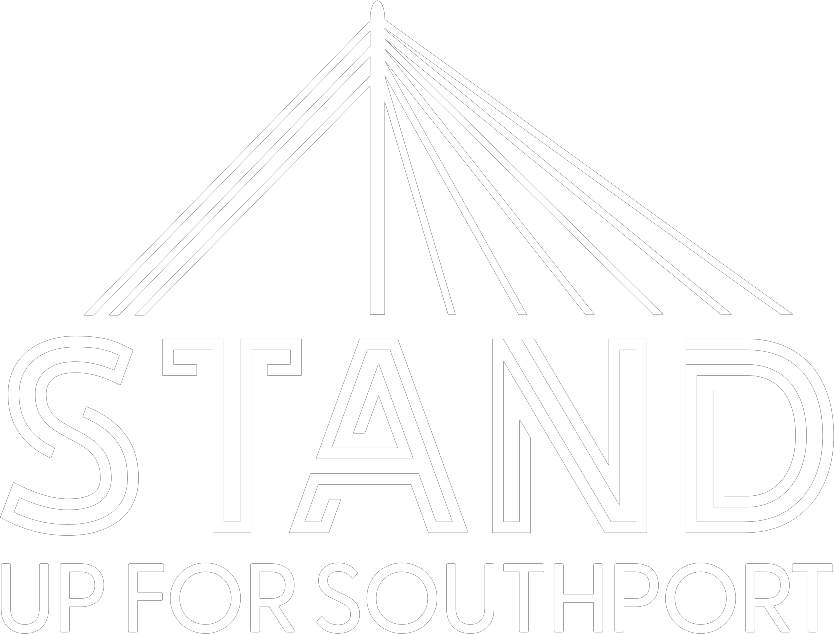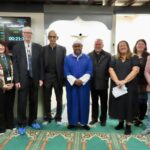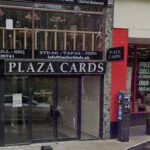Southport MP Patrick Hurley has made a plea for unity and compassion in the UK saying society should “unify, acknowledge our differences and live together under a common identity”.
Mr Hurley spoke to a packed audience at the Open Day hosted by Southport Islamic Society Mosque and organised by The Light Foundation where the theme was ‘Celebrating One Community’.
He was joined in making speeches by leaders of various faiths and by civic and community leaders from across Merseyside, led by Imam Ibrahim Hussein.
Others delivering speeches were Lord Lieutenant of Merseyside Mark Blundell, Sefton Council Leader Cllr Marion Atkinson, Merseyside Police and Crime Commissioner Emily Spurrell, Southport and District Reform Synagogue Chair Dr Selwyn Goldthorpe, Merseyside Police Head of Local Policing Natalie Perischine, Southport Hospital Chaplain Jan Fraser, and Holy Family Church Parish Priest Father Kevin McLoughlin.
Last summer, Southport Mosque was attacked by rioters in an incident which left over 50 police officers needing hospital treatment.
The next morning, Southport residents turned out in their droves to rebuild the broken Mosque wall, make repairs to local shops, homes and cars which had been vandalised, and to bring food and drinks.
It is that sense of community and unity which Patick Hurley says is so important.
He said: “We live in polarised times.
“Across the country, cheap flags tied to lampposts are looking bedraggled after being put up a month ago as part of something called ‘Operation Raise the Colours’.
“The founders of the campaign say that this is with the aim of promoting patriotism. They deny that their intention is to intimidate. But leaving aside the intention, the outcome is indeed that some feel intimidated. Because one person’s innocent expression of their own culture can easily be perceived by others as an implied attack on their identity.
“Meanwhile, a supposedly Christian group calling themselves ‘The King’s Army’ and dressed in black uniforms have taken to the streets of central London to protest about ‘immoral culture’. To be clear, uniformed street protests of this sort have been illegal in the UK since the 1930s, under legislation brought in to halt the rise of the British Union of Fascists.
“There was an arsonist in Sussex who attacked a Mosque on Friday. Damage to the Mosque, but no reported injuries, thankfully.
“And earlier in the week, a terrorist attack on a Synagogue in Manchester, leaving two Jewish men dead.
“This all shares an affinity with the politics of other places that we are not used to on our island. “Politicians on the extremes defend the rights of their supporters to fly a flag, or to undertake a march, or to protest. And yes, they are rights, and those rights are important to defend. And sometimes, in the interests of being good neighbours, it may also be best not to take advantage of those hard-won rights.
“Just because we can do something, it doesn’t mean we should.
“Because the flags that get flown may embolden the online loner in his bedroom. And the online loner in his bedroom may join a uniformed street gang. And the uniformed street gang gives validation to the arsonists and the knife-wielding extremists, and to the beered-up thugs who threw bricks at this Mosque.
“The more we see of this, the more the divides are embedded. So the answer is not to retreat into our own group, to fly our own flags and to unwittingly intimidate our friends and neighbours.
“The answer is to invite people in. To unify, acknowledge our differences and live together under a common identity.
“To reach across faith, community, political and tribal boundaries. To get offline and to get back into the real world.
“There’s a statistic that’s struck with me since I first heard it. And that’s this. The rise in the propensity to support political parties on the extremes correlates closely with the closure of community venues such as pubs, youth clubs and libraries. That might be because people want to protest against the negative changes in their neighbourhoods. But it might also be because people spend less time in the real world, getting to know people different from them in outlook or faith or culture. They spend more time being validated online and encouraged to go further in their views.
“Unless we all look into ourselves and reach across our own divides, reach out of our own comfort zones and consider the views of the people with whom we share a town, if not a political perspective. Unless we do that, the cycle of division will embed.
“I’d like to again thank Ibrahim and his colleagues at the Mosque, and I’d like to thank the representatives of other faith communities in the town, for reaching out beyond their own circles. “And I’d like to thank all those who have followed their lead in also reaching out to others, rather than retreating into the false promises of division.”
Do you have a story for Stand Up For Southport? Do you need advertising, PR or media support? Please message Andrew Brown or email: mediaandrewbrown@gmail.com






